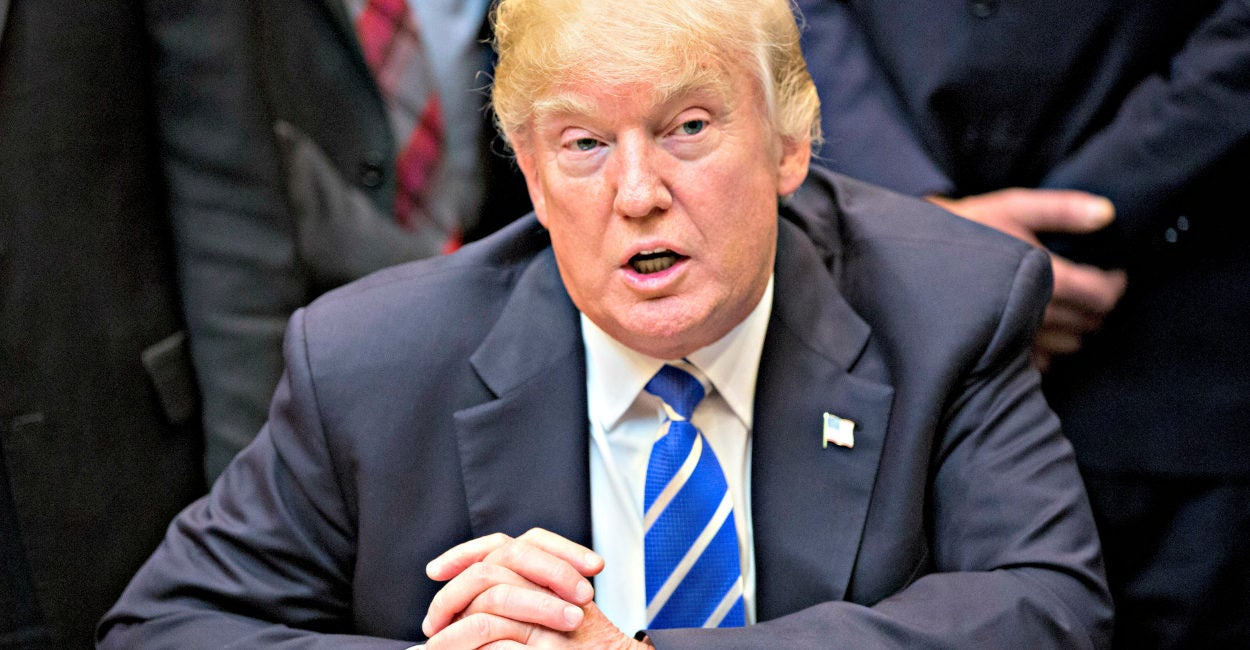
President Donald Trump, here speaking Monday
during a signing ceremony at the White House, appears ready to pivot to
tax reform after the collapse of Republicans' health care bill. (Photo:
Andrew Harrer/SIPA/Newscom)
The White House sees the
possibility of broad support for tax reform, and an opportunity for
President Donald Trump to take up an issue that hasn’t advanced in three
decades—fresh off a legislative defeat Friday on replacing Obamacare.
The United States has the highest corporate income tax rate of any country in the Organization for Economic Cooperation and Development (OECD), the 34 most industrialized nations in the world.
“Our tax code is outdated,” @PressSec says.“It’s been 30 years. We have an economy that has evolved, especially in the technology area that has made a lot of things change, and I think our tax code is outdated,” White House press secretary Sean Spicer told reporters Monday. “Frankly, on the business side, we are uncompetitive. There is a reason companies are leaving America to go to other places.”
The United States has the highest corporate income tax rate of any country in the Organization for Economic Cooperation and Development (OECD), the 34 most industrialized nations in the world.
After 2013 tax increases, small business owners can pay a top federal income tax rate of 39.6 percent, and an additional 3.8 percent investment surtax that became law as part of Obamacare. The 2013 deal also pushes the top federal tax rate on small business income to 43.4 percent.
Large corporations actually pay a lower federal tax rate of 35 percent, according to an analysis by The Heritage Foundation.
Trump and House Speaker Paul Ryan had argued that a failure to pass Republican leadership’s American Health Care Act would inhibit achievement of tax reform. As it turned out, conservatives successfully opposed the bill for not fully repealing Obamacare.
“We will probably be going right now for tax reform, which we could have done earlier, but this really would have worked out better if we could have had some Democrat support,” Trump said Friday after the collapse of the health care bill.
After Ryan pulled the GOP health care bill for lack of enough Republican votes, the Trump administration reportedly is looking past conservative Republicans in Congress to try to build a coalition of centrist Democrats to pass tax reform.
Republicans for years have sought to reform a long, complicated tax code, simplifying it both to lower rates and to make compliance cheaper. The bipartisan Simpson-Bowles commission also called for simplifying the code to reduce deductions.
Senate Minority Leader Charles Schumer, D-N.Y., said over the weekend, referring to Republicans and the health care bill: “They’re going to repeat the same mistake they made on Trumpcare with tax reform.”
Bipartisanship isn’t likely, said Grover Norquist, president of Americans for Tax Reform.
But Norquist said tax reform will have to come without the $1 trillion in tax cuts that were part of the scuttled House GOP’s plan to repeal and replace Obamacare, which he supported.
A bill would have to be crafted to pass with a simple majority in the 100-member Senate to prevent a Democratic filibuster, he said.
“It is still possible to have some tax reform, but it would have to be with 51 votes in the Senate,” Norquist told The Daily Signal. “There aren’t eight Democratic votes for it.”
Norquist said he sees three likely options at this point: One, though unlikely, would be to redo the health care bill to cut the $1 trillion in taxes.
The second option would be a “watered down” proposal cutting the top corporate tax rate to 28 percent, rather than 20 percent as Republicans in Congress have proposed. The third option would be to go big on tax reform—or push for the entire House GOP proposal—but make the cuts temporary, “sunsetting” in 10 years, to win over moderate votes.
House Republicans’ “Better Way” blueprint for tax reform would produce the lowest marginal tax rates since the 1920s.
The top individual rate would drop from 43.4 percent to 33 percent. The top rate for corporations would drop from 35 percent to 20 percent, and the top rate for small businesses would drop from 43.4 percent to 25 percent.
The Tax Foundation, a conservative-leaning tax research and advocacy group, estimates the House plan would grow the economy by 9.1 percent over 10 years, while reducing revenue by $191 billion.
Sens. Mike Lee, R-Utah and Marco Rubio, R-Fla., together have introduced a tax reform proposal, and Sens. Rand Paul, R-Ky., and Ted Cruz, R-Texas, have introduced separate plans.
The Trump proposal most likely would try to follow the House blueprint, said Adam Michel, an economic policy analyst with The Heritage Foundation.
“I hope Republican leadership learned a little bit from the health care bill about building consensus among members,” Michel told The Daily Signal, adding:
It will be about simplifying corporate and individual rates, and simplifying and eliminating some deductions. The Obama administration supported lowering corporate rates and eliminating deductions at one point, so there is at least theoretically some bipartisan support.Michel, however, said he doesn’t anticipate there will be bipartisan support for the bill in the current political climate.
Congressional Democrats appear ready to oppose Trump on everything except, perhaps, a proposal to rebuild the nation’s infrastructure.
No comments:
Post a Comment